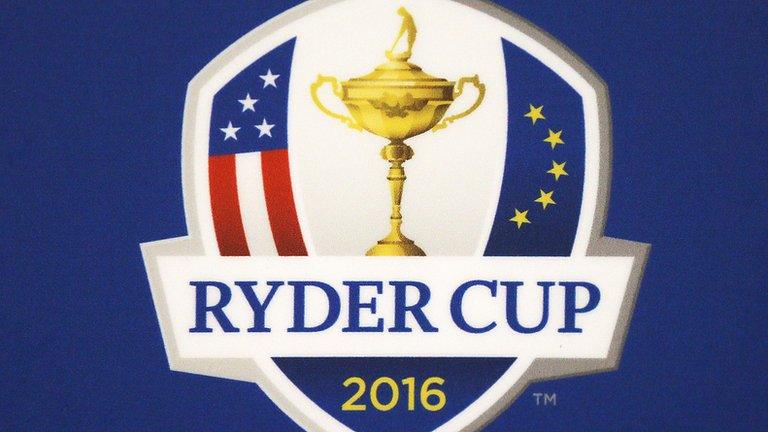Ryder Cup 2016: US beat Europe as miracle fails to materialise
- Published
- comments
Moore seals Ryder Cup triumph for US
That's the thing about miracles. They don't tend to happen every time you want one.
USA's 17-11 Ryder Cup win over Europe started with a sprint and finished in a stampede, a long, painful wait ended with a collective roar of triumph and relief.
Europe began those singles needing seven and a half points and came up three short, the game up early, the spirit of Medinah invoked but seldom stirred.
A clean sweep on the first morning, a ruthless polishing off on the final Sunday. If a fight-back came in between on this sun-smeared slice of Minnesota countryside, it rapidly withered as the US players stormed back in the singles, fired up by intensely partisan support, inspired by the bellicose Patrick Reed and their contrasting memories of that stunning reversal four years ago.
This was the highest number of points a US team had scored in 35 years, an affirmation of so much that their captain Davis Love and his 11-man task-force have done, an evisceration of a European team with three great players but too many who faltered in the fierce early autumn heat.
Only early in the afternoon were the scoreboards around this heaving course awash with the blue of Europe. Two hours into a day that had opened with mass chants of, "I believe that we will win!" from those in red around the first tee, Darren Clarke's men were up in six matches, all-square in four and down in just two.
Around an hour later that had switched to up in four and down in six. It would never get better. It would never come back.
For lightning to strike again you felt that Rory McIlroy, conductor in chief across the first two days, had to win his first-up fight against the relentless Reed, an often controversial figure in American golf, who has stepped out of the shadows here and delighted in stomping centre-stage.
'Ding dong' battle between Rory McIlroy & Patrick Reed
We thought it would be the Tussle of the Talismen, but for a long while it went a lot further: a flat-out fist-fight of a contest, an unrelenting game of golfing one-upmanship, a showdown that teetered along the edge of what was acceptable and then swept you away again on the next exchange of cavalier shot-making before you could worry too much about the morality of what had just happened.
There were drives that rendered slick fairways irrelevant and short irons that went for broke and usually made it. Most of all there were putts from all over - rolling over Hazeltine's infamous cruel contours, from backs of greens, from backs to the wall.
Reed roared at the galleries, the galleries roared back. Rory shushed them, and when that didn't work, screamed at them that he couldn't hear them, when people living several miles away were watching ornaments fall off their shelves.
Reed fist-pumped his arms like a man pulling at the reins of a runaway chariot. He mocked McIlroy with a faux-bow to match the one the Northern Irishman had given on the 16th on Friday, and then wagged an admonishing finger across the green but in his face.
McIlroy swung upper-cuts at the air like Barry McGuigan and matched his opponent blow for blow. On the eighth they were locked together, and it was there that their duel produced pure magic: McIlroy arrowing in an impossibility of a putt from all of 50 feet, Reed looking up, taking aim from the fringes and crushing home his own from 20 feet too.
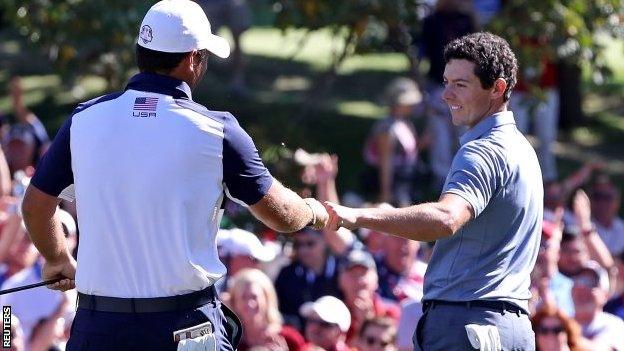
Amid the chaos on the eighth green, there was the mutual respect of a fist bump between McIlroy and Reed
It would be McIlroy who buckled first, his putter suddenly turning cold on the 12th and 13th, Reed opening his lead with a soft-handed bunker shot on 16 and then yet another dead-eyed putt on the last to seal both the first point of the day and the most important.
If it was a classic, the halved point between Phil Mickelson and Sergio Garcia was arguably even better, a ding-dong of 19 birdies that neither deserved to lose.
Behind that, despite the heroics of rookies Thomas Pieters and Rafa Cabrera-Bello, too few other Europeans deserved to win.
Pieters was flawless, a young man who has only ever played in two majors but who flourished under the unparalleled pressures of an overseas Ryder Cup to win four of his five matches, the first European debutant in history to take home such a haul.
Cabrera-Bello too, another unheralded name who some feared would lack the chutzpah to survive in a bear-pit like this, won three of his matches and halved the other, the pair of them surely staples for the European team for years to come.
Ryder Cup 2016: Best shots of singles
The disappointments came from those steeped in experience.
Lee Westwood, in his 10th Ryder Cup, failing to win a single point from his three matches, twice seeing a late lead turned to cruel defeat.
His friend, Danny Willett, Masters champion but taught an inadvertent lesson by the inflammatory comments of his brother and the peculiar stresses of this old competition.
Martin Kaymer, twice a major champion and sinker of the winning putt in Medinah but winning only one point from four this time around, and that when the battle had already been lost.
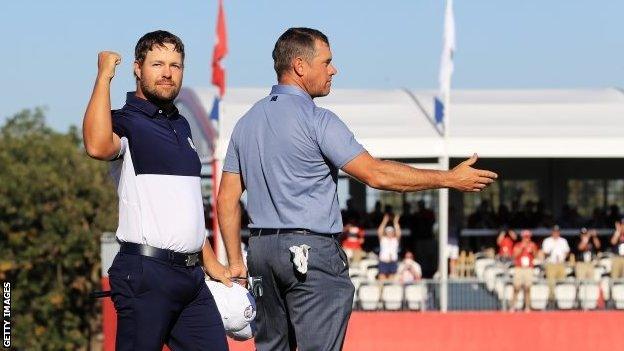
Westwood was two up after 15 holes but lost the last three as Moore secured the winning point for the US
Perhaps it may not all be a bad thing.
There is the redemption for Love, chastised four years ago when let down late by stalwarts who should have closed that contest out. There is the continued joy in watching Mickelson grin at the passing years and thumb his nose at his driving stats as he makes chips and putts of casual magic. There is the emergence of Reed as an unlikely folk hero, and there is the pleasure in seeing usually staid figures like Brandt Snedeker turned into animated conductors of an atmosphere that still has no match in this sport.
And there is what it does for this 87-year-old competition, dominated to an unprecedented extent by Europe over the past 25 years but now given fresh impetus by only a second US victory in 16 years.
If Love's team were strong favourites before we arrived in Hazeltine, it was also clear that this was a Ryder Cup they could not lose. Having thrown so much at it they were left with little else to offer and even less to inspire their hungry home support.
Instead we will head to Paris and the first French hosting in two years' time not only for a fresh start but also that familiar essential of two-way sporting rivalries: a desire to win the thing back.
Retaining trophies is fun. Winning them back, as the Champagne-soaked scenes around the 18th green here on Sunday afternoon graphically illustrated, is even better.
We've launched a new BBC Sport newsletter, bringing all the best stories, features and video right to your inbox. You can sign up here., external
- Published2 October 2016
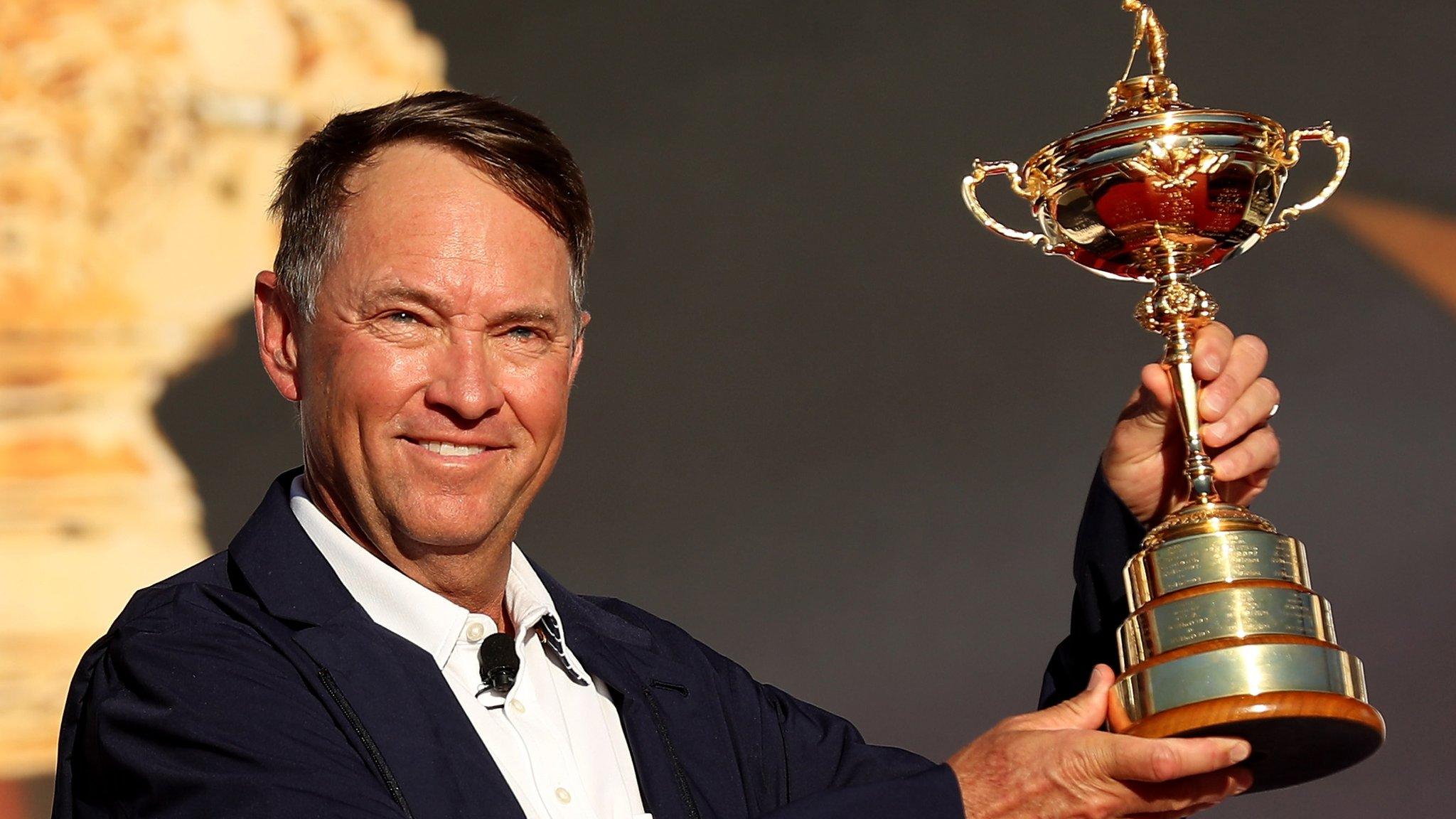
- Published26 September 2016
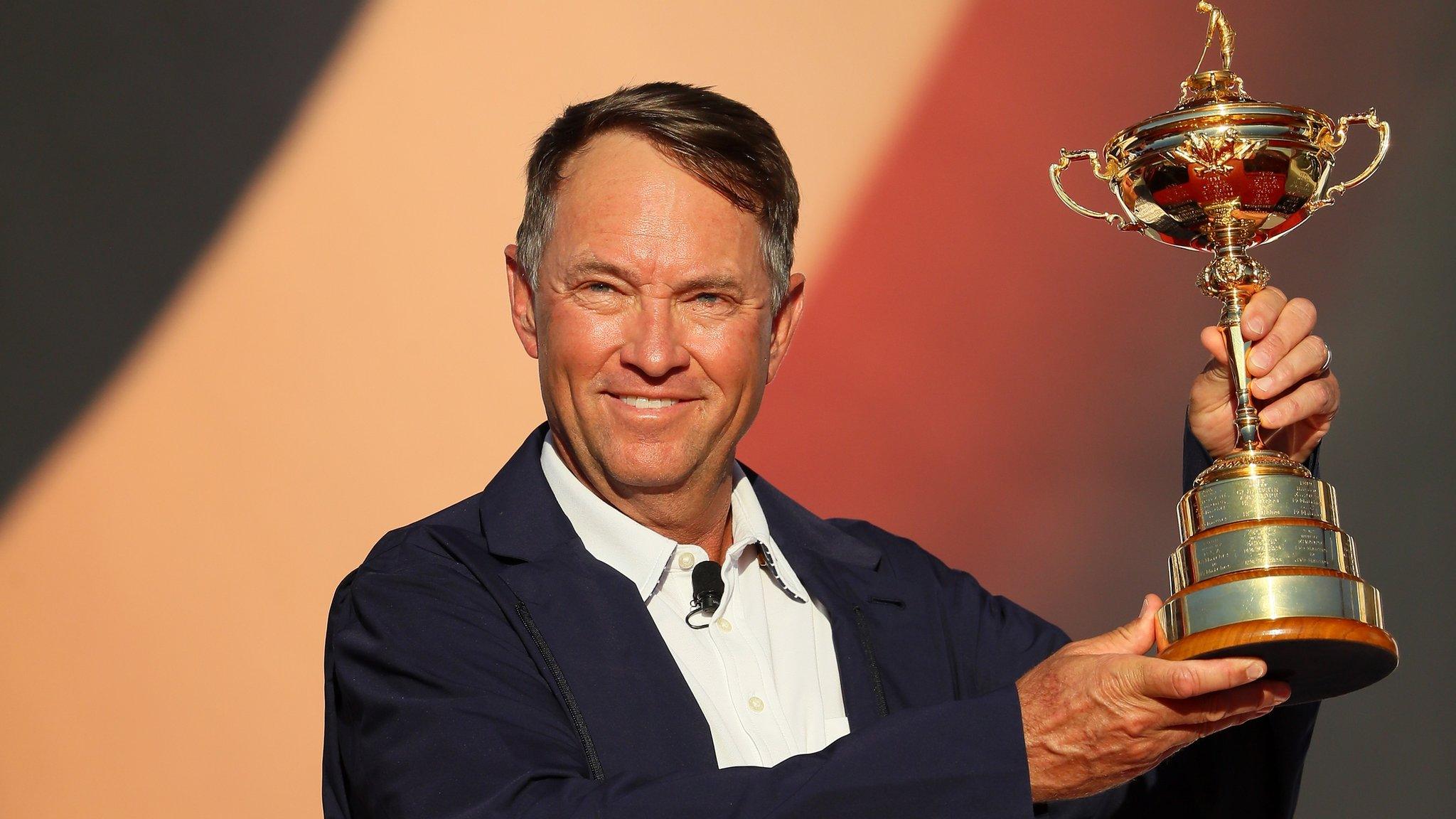
- Published2 October 2016
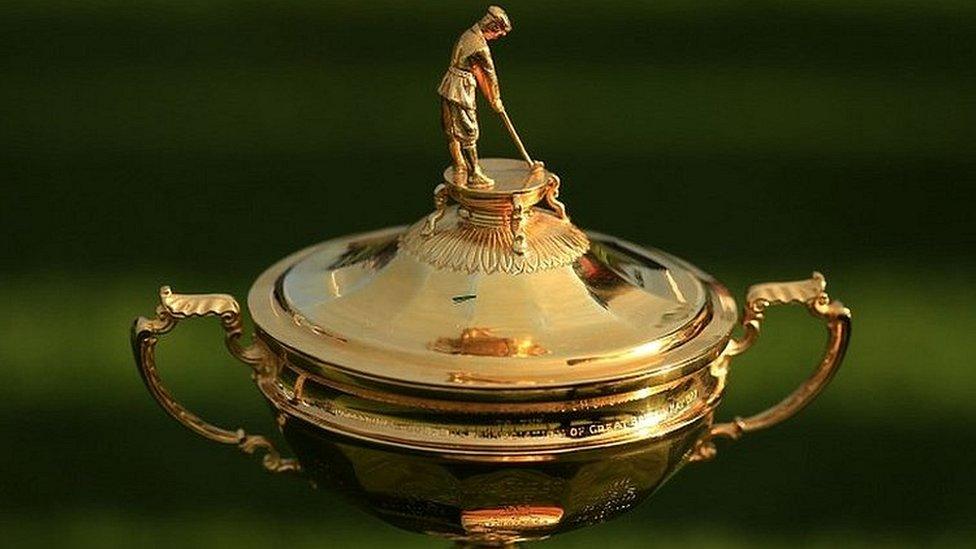
- Published2 October 2016
